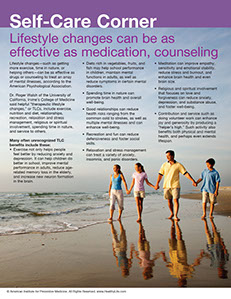SYMPTOM CHECKER
CONDITIONS
Male
Female
Child
Arm, Hand & Shoulder Concerns
Legs & Feet Concerns
Dental & Mouth Concerns
Ear & Nose
Eye Conditions
Head Conditions
Arm, Hand & Shoulder Concerns
Legs & Feet Concerns
Front
Back
Arm, Hand & Shoulder Concerns
Dental & Mouth Concerns
Ear & Nose
Eye Conditions
Head Conditions
Arm, Hand & Shoulder Concerns
Dental & Mouth Concerns
Ear & Nose
Eye Conditions
Head Conditions
Front
Back
Arm, Hand & Shoulder Concerns
Neck Links
Head & Neck Concerns
Arm, Hand & Shoulder Concerns
Neck Links
Head & Neck Concerns
Front
Back
Online Clinic
Wise Healthcare
Lifestyle changes can be as effective as medication, counseling

Print on Demand
RELATED ARTICLES
Lifestyle changes—such as getting more exercise, time in nature, or helping others—can be as effective as drugs or counseling to treat an array of mental illnesses, according to the American Psychological Association.
Dr. Roger Walsh of the University of California, Irvine’s College of Medicine said helpful “therapeutic lifestyle changes,” or TLCs, include exercise, nutrition and diet, relationships, recreation, relaxation and stress management, religious or spiritual involvement, spending time in nature, and service to others.
Many often unrecognized TLC benefits include these:
• Exercise not only helps people feel better by reducing anxiety and depression. It can help children do better in school, improve mental performance in adults, reduce age-related memory loss in the elderly, and increase new neuron formation in the brain.
• Diets rich in vegetables, fruits, and fish may help school performance in children, maintain mental functions in adults, as well as reduce symptoms in certain mental disorders.
• Spending time in nature can promote brain health and overall well-being.
• Good relationships can reduce health risks ranging from the common cold to strokes, as well as multiple mental illnesses and can enhance well-being.
• Recreation and fun can reduce defensiveness and foster social skills.
• Relaxation and stress management can treat a variety of anxiety, insomnia, and panic disorders.
• Meditation can improve empathy, sensitivity and emotional stability, reduce stress and burnout, and enhance brain health and even brain size.
• Religious and spiritual involvement that focuses on love and forgiveness can reduce anxiety, depression, and substance abuse, and foster well-being.
• Contribution and service such as doing volunteer work can enhance joy and generosity by producing a “helper’s high.” Such activity also benefits both physical and mental health, and perhaps even extends lifespan.
This website is not meant to substitute for expert medical advice or treatment. Follow your doctor’s or health care provider’s advice if it differs from what is given in this guide.
The American Institute for Preventive Medicine (AIPM) is not responsible for the availability or content of external sites, nor does AIPM endorse them. Also, it is the responsibility of the user to examine the copyright and licensing restrictions of external pages and to secure all necessary permission.
The content on this website is proprietary. You may not modify, copy, reproduce, republish, upload, post, transmit, or distribute, in any manner, the material on the website without the written permission of AIPM.
2021 © American Institute for Preventive Medicine - All Rights Reserved. Disclaimer | www.HealthyLife.com















































